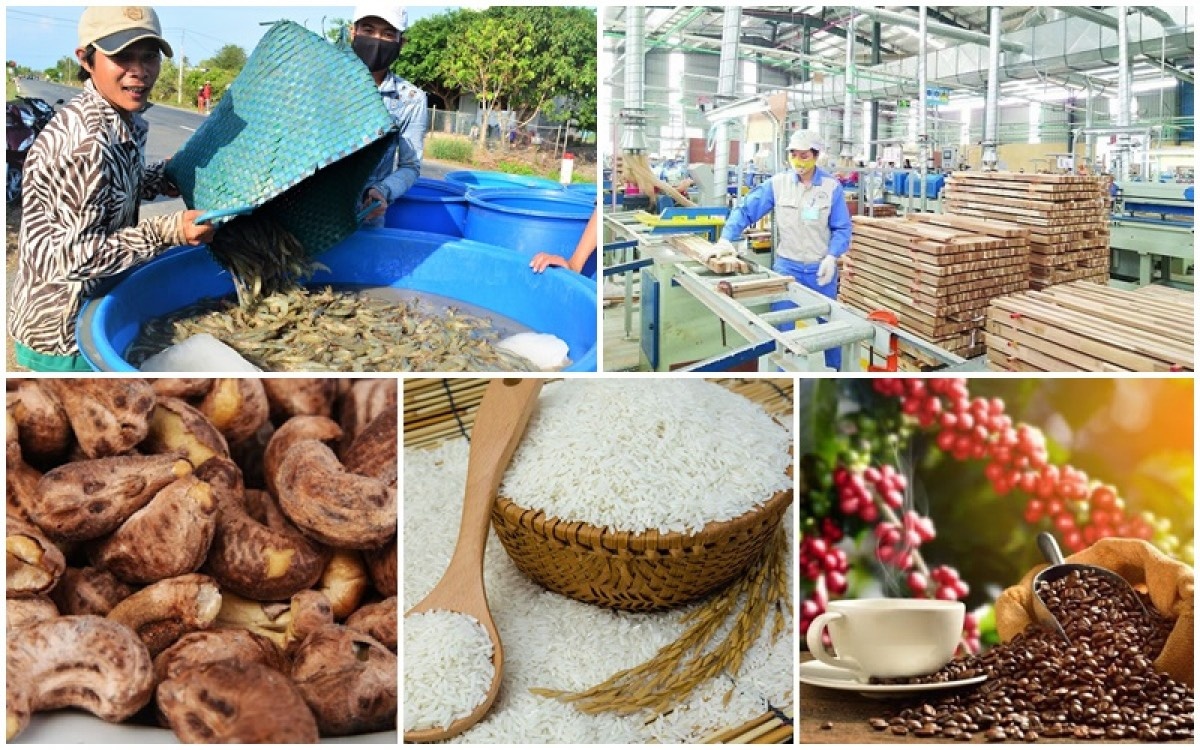Bright door for Vietnamese goods to enter Asia - Africa market
The Asia-Africa region has always been an important market for Vietnam. Promoting exports to this region is an important part of Vietnam’s economic development strategy. These are also two markets considered suitable for Vietnamese goods to expand their market share in the future.
According to statistics from the General Department of Customs, in the first quarter of 2024, import and export with the Asia - Africa region is estimated to reach 117 billion USD (accounting for 67% of the total import and export value with the world), an increase of nearly 13% over the same period in 2023. Of which, exports to the Asia - Africa region are estimated to reach 46 billion USD (accounting for 49%), an increase of 11.8%. Notably, export turnover increased sharply in all major trading partners such as: China (9.8%), Hong Kong (40.5%), South Korea (10.4%), Japan (7.1%), Indonesia (28.8%), Singapore (17.8%)...
Potential market for Vietnamese goods
Exports of traditional and important Vietnamese goods to the Asia-Africa region still maintained good growth. Specifically, means of transport and spare parts reached 6.5 billion USD, up 23%; computers, electronic products and components reached 28.3 billion USD, up 6.4%; footwear of all kinds reached 5.1 billion USD, up 2.5%; rice reached 3.8 billion USD, up 38.3%; vegetables and fruits reached 4.4 billion USD, up 86%; cashew nuts reached 1.7 billion USD, up 26%; coffee reached 1.2 billion USD, up 19%...
While the groups of processed and manufactured goods, construction materials, and mineral fuels decreased, the group of agricultural and aquatic products had good growth of 14%.
For example, Bac Giang's lychee holds a "firm" position in key markets. In 2023, out of a total of 111,000 tons of lychee exported, Bac Giang exported the majority to the Asia - Africa market (the Chinese market accounted for 99%, the rest was exported to countries such as Australia, UAE, Southeast Asia and some other markets such as the US, Taiwan, EU...).
 |
Vietnam's export of goods to the Asia-Africa market has improved, but difficulties and limitations for businesses still exist. |
Similarly, tea is also a strong product of the Northern midlands and mountainous region, reaching 43.4 million USD in the first quarter of 2024, an increase of 23.1%; to the Asia - Africa market, it reached 28.1 million USD, an increase of 2% over the same period in 2023.
“Asia and Africa are two very potential markets. To penetrate this market, businesses like ours have proactively innovated production lines, invested in modern machinery and equipment, and improved designs; tea products strictly follow the production process from tea planting, harvesting, preservation to processing; have achieved Organic, Halal, GMP, Rainforest Alliance standards...”, said Ms. Nguyen Thi Loan - Director of Tam Duong Tea Investment and Development Joint Stock Company (Lai Chau).
Vietnam is considered to have many important advantages when promoting exports in this region to become an ideal bridge between Asia and Africa. In addition, Vietnam's economy is growing strongly, with steady growth in industries such as information technology, manufacturing, and agriculture, creating great potential for expanding exports to new markets.
In recent years, Vietnam has paid special attention to strengthening economic cooperation with countries in the Asia-Africa region. Free trade agreements have been signed, opening the door to access new markets and reducing trade barriers.
Vietnam has also taken advantage of multilateral cooperation opportunities through regional organizations such as ASEAN and other trade agreements such as the Comprehensive and Progressive Agreement for Trans-Pacific Partnership (CPTPP).
“The Asia-Africa region has always been an important market for Vietnam. Promoting exports to Asia-Africa is an important part of Vietnam's economic development strategy. By effectively exploiting the potential of these markets and promoting economic cooperation, Vietnam can continue to achieve significant success in expanding and diversifying its export markets,” said Mr. Do Quoc Hung, Director of the Asia-Africa Market Department (Ministry of Industry and Trade).
Need to resolve challenges
According to experts, promoting export expansion in Asia - Africa is not only a great opportunity but also a challenge for Vietnam's economy. Although Vietnam's export of goods to Asia - Africa markets has improved recently, experts say that there is still a lot of room for market expansion, but there are still difficulties and limitations for businesses.
One of the biggest challenges is fierce competition from other major economies in the region. To compete effectively, Vietnam needs to improve product quality, improve transportation infrastructure and reduce production costs to build distinctive brands for its strong products, and facilitate connections with importers.
In addition, risks of market and political fluctuations can also affect Vietnam's export expansion. The current difficulties of enterprises are the lack of information on market demand and import standards of the market; lack of support to connect foreign enterprises and importers; failure to penetrate the distribution chain, as well as failure to take advantage of cross-border e-commerce channels; unsecured production and processing leading to violations of food hygiene and safety standards and market import standards are still very common.
In addition, product quality and safety standards are also issues of concern. Each country has its own standards on product quality and safety, which requires Vietnam to comply with and adapt to these requirements to avoid legal risks and continue to maintain the export market.
To address these challenges, the Government is increasing support for businesses, especially small and medium-sized enterprises, so that they can adapt and take advantage of opportunities from expanding exports.
Specifically, applying preferential tax policies for export products to increase competitiveness and encourage businesses to participate in international markets. In addition, it also supports businesses in resolving legal issues, customs and other risks when participating in export markets to reduce the burden and increase the ease and flexibility in international business.
In addition, production organization (such as planning growing areas, proactively providing varieties and fertilizers, etc.), improving product quality (growing area codes, packaging facilities, etc.), as well as cooperation to improve preservation technology, processing technology, etc. play an important role in enhancing product value chains to maintain export market share in traditional markets such as ASEAN, China, Japan, Korea, Australia, New Zealand, etc. At the same time, it is necessary to continue to improve the logistics system and infrastructure system at border gates to ensure smooth customs clearance of agricultural products across the border, etc.
Experts predict that the world economy and the Asian and African economies will continue to grow steadily in the future, creating many new opportunities for countries like Vietnam to expand their export markets. In addition, the development of technology and digital transformation continues to have a profound impact on industries, creating favorable conditions for Vietnamese enterprises to access and expand export markets.
Thuy Linh


